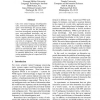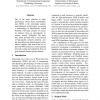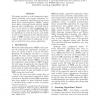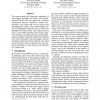23 search results - page 2 / 5 » An End-to-End Supervised Target-Word Sense Disambiguation Sy... |
102
click to vote
NAACL
2010
14 years 9 months ago
2010
Like most natural language disambiguation tasks, word sense disambiguation (WSD) requires world knowledge for accurate predictions. Several proxies for this knowledge have been in...
ACL
2010
14 years 9 months ago
2010
ACL
2004
15 years 1 months ago
2004
Supervised learning methods for WSD yield better performance than unsupervised methods. Yet the availability of clean training data for the former is still a severe challenge. In ...
CORR
2000
Springer
14 years 11 months ago
2000
Springer
This paper describes a set of comparative experiments, including cross{corpus evaluation, between ve alternative algorithms for supervised Word Sense Disambiguation (WSD), namely ...
EMNLP
2004
15 years 1 months ago
2004
This paper explores the large-scale acquisition of sense-tagged examples for Word Sense Disambiguation (WSD). We have applied the "WordNet monosemous relatives" method t...




